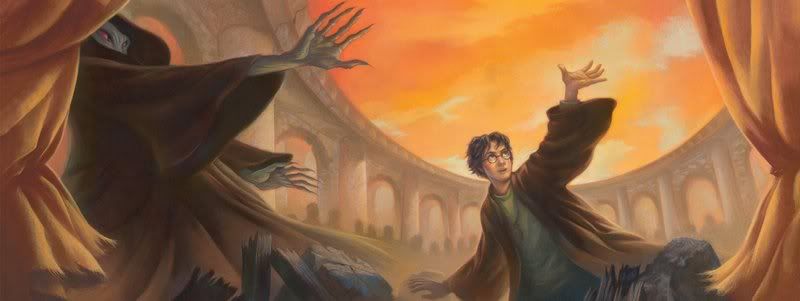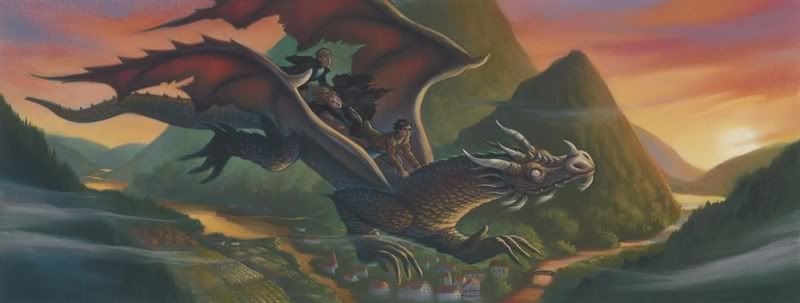
The covers for
Harry Potter and the Deathly Hallows were released a little more than a month ago, and a great deal of fans have weighed in on what the covers show and how they pertain to the final novel. This article will be the first of a two-part series on my take on the covers. I doubt that I'll say anything new but I do hope to contribute somewhat to the discussion. Enjoy.
Mary GrandPré is a brilliant artist whose covers for Scholastic, at least from
Order of the Phoenix on, fascinate me. And she does not disappoint with her artwork for
Deathly Hallows (hereafter
DH), which is in my opinion better than the British covers from Bloomsbury.
At first glance Harry seems to be hailing or welcoming something or maybe more importantly, someone. I have heard Snape or Fawkes as possibilities and while both are viable options, we won't know for sure until
DH comes out. Harry's posture is particularly interesting because in the full jacket image (located at the bottom of this post), he is not facing Voldemort, who is also preoccupied with what Harry is seeing. Unfortunately we cannot see what they are seeing. Voldemort's pose suggests fear as he places his hands in front of him, shielding himself (or perhaps pushing something away) from what he is seeing. Harry, in contrast, is showing no fear and his pose suggests victory and triumph. Rumor, a regular poster at Hogwarts Professor (John Granger's blog) has some interesting words on the cover in the thread,
Waiting for Harry: The New Cover at the Barnes & Noble message boards.
O.K. I am now going to employ my wisdom of how to critique a work of art since that is what my major in college was, Art History. First of all in the U.S. version Harry is in the Christ pose (in the shape of a cross). That was my first hunch, as it goes with the Christian theme. If you have studied as many images, (1000's) as I have of Christian art, you will notice that right away. Grand Pre would have had to learn art history if she attended any college in the western world and would definitly know about this. Of course it is JKR's book, and she would know her story...Just my take, but you can take the Christ pose symbolism to the bank. Oh and I cannot believe I missed this, but Harry is looking up toward heaven and at his feet are the destroyed fragments of wood, symbol of the cross.
I took an art history course in college and although I do not claim to be an expert in art history and criticism, I do agree with much of what rumor wrote above. The outstretched arms of Harry Potter have their parallel in Christian art, which a cursory glance of paintings, mosaics, and sculptures will attest to, specifically in the figure of Christ on the cross, his resurrection, and his ascension into glory (a good resource is
Seeing Salvation: Images of Christ in Art by Neil MacGregor with Erika Langmuir). Travis Prinzi of
Sword of Gryffindor mentioned in the comments in his post,
Deathly Hallows Cover Revealed, that even "though all the letters in “and the Deathly Hallows” are [in] CAPS, the T’s are in the shape of crosses". So we are seeing "cross" imagery being invoked in this cover as proof by the lettering of the title, the shattered wood nearby, and Harry's pose.

Another theme that the cover explores is the downfall of Voldemort. I mentioned earlier that Voldemort's look and pose suggests fear. Now the image on the left that is eerily similar to the
DH cover is an oil on canvas titled
The Fatal Hour: Fantastic Subject by Alexandre Evariste Fragonard (1780-1850). The subject of the painting is clutching a curtain as a devil approaches him amidst the yellow, sulfuric sky. This scene hearkens to the tragic story of Doctor Faustus (there are many variations on the Faust legend but I will concern myself with the play by Christopher Marlowe), who sold his soul to the Devil for magical power, and wrestles with the implications of his ill fated decision. At the heart of the Faustian legend is the evil of bargaining your soul for forbidden knowledge (a great essay on this topic is
Tom Riddle and the Faustian Pact by Canis sapiens). We know from Voldemort's (whose name means "flight from death") back story that he fears death and wants to live forever. His quest for eternal life leads him to seek forbidden knowledge through the study of horcruxes thereby dividing his soul through murder. Voldemort best exemplifies what Christ said, "For what is a man profited, if he shall gain the whole world, and lose his own soul?" (Matt. 16.26). The
DH cover gives us a glimpse of Voldemort's "Fatal Hour" when he will be confronted with the implications of his Faustian pact and show fear. Perhaps he will utter the words of Faustus when the clock struck twelve, "It strikes, it strikes! Now body, turn to air, Or Lucifer will bear thee quick to hell! O soul, be changed into small water-drops And fall into the ocean, ne'er be found" (5.2.190-194). The only difference is that the Dark Lord will only possess only a fragment of his soul and that will be enough for his opponent, Harry who boasts an untarnished soul filled with the power he knows not, to exploit and vanquish him. This power is love.
Notice the red lettering of "Harry Potter" and "J.K. Rowling" on the cover. John Granger, who writes frequently on the alchemical imagery in Harry Potter wrote, "If we had any doubt, we are certainly in the
rubedo now" (emphasis not mine). According to Lyndy Abraham, the rubedo is "the reddening of the white matter of the Stone at the final stage in the opus alchymicum" and the "silvery moonlight and dawn light of the albedo phase develop into the golden illumination of the midday sun, symbolizing the attainment of the philosopher's stone, the attainment of the consciousness of God, the goal of the opus" (
Dictionary of Alchemical Imagery, 174). This certainly explains the yellow sky in the
DH cover invoking the golden imagery of the finishing of the Great Work in Harry Potter, culminating in the vanquishing of Voldemort.
In the back of Harry and Voldemort, there is a old circular stone structure with arches that is similar in style to a roman aqueduct. There are many aqueducts in Great Britain; chief among them is the Pontcysyllte Aqueduct, which carries the Llangollen Canal over the River Dee valley in north Wales. Another possibility is the raised stone platform where the Hogwarts Express rides on its way to the school. These seem like tempting options although I have no idea why Harry and Voldemort would choose to face off near a aqueduct or a train platform.
Much has been written on the curtains and the possibility that we are seeing a glimpse of the two beyond the Veil. I doubt this for several reasons. First the stone archway in the cover does not fit the description of the "ancient, cracked, and crumbling" archway in the Ministry. In addition the archway is hung with a "tattered black curtain or veil" while the curtains in the
DH cover are certainly not black but a mix of orange and brown. Furthermore in the cover, the curtains are disassociated from the archway therefore the archways are not the same. The only viable explanation, in my opinion, is that the presence of curtains signal the end of the series, like the closing of the play. If you take a glance at the full cover jacket of the first novel, you see curtains as well.
In the amphitheater-like background, there are figures (I do not believe these are graves we are seeing) looking down on Harry and Voldemort. We do not see their faces but they are most likely Death Eaters although some have theorized that they are Voldemort's victims watching the battle. Pat Henderson of Eeyore's Reflections wrote in her blog that "With the arches behind them, and something that looks like spectators in the background, the picture calls to mind a place like the coliseum--and that reminds me of this passage from "Harry Potter and the Half-Blood Prince", after Dumbledore explained to Harry that the Prophecy was only important because he and Voldemort chose to act upon it." Here is the quote again from the previous novel:
But he understood at last what Dumbledore had been trying to tell him. It was, he thought, the difference between being dragged into the arena to face a battle to the death and walking into the arena with your head held high. Some people, perhaps, would say that there was little to choose between the two ways, but Dumbledore knew - and so do I, thought Harry, with a rush of fierce pride, and so did my parents - that there was all the difference in the world (HBP, 512).
Harry understands the importance of choosing how he meets his end. In
Goblet of Fire, Harry was dragged via the Triwizard Cup portkey and was forced to duel the Dark Lord. In the final novel Harry will confront Voldemort in that arena on his terms. Harry had no choice or control over the events that led Voldemort to visit Godric's Hollow that Halloween night and kill his parents. Harry survived the Avada Kedavra curse because his mother sacrificed herself for him. She had a choice. Voldemort gave her one and she chose death to give her son life. Harry has a choice and we all know that he has made it already. Harry will walk into that arena and if this cover is any indication, Harry face Voldemort with his head held high.




